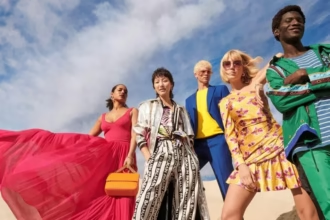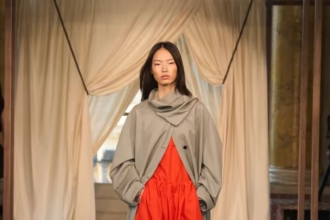Published
September 7, 2025
Federico Marchetti, the founder of Yoox Net-a-Porter Group, owned by Mytheresa, and now Chair of King Charles III’s Sustainable Markets Initiative’s Fashion Task Force, is sharing his rags-to-riches story from a small town in Italy to establishing one of fashion’s first and most disruptive online empires in his revealing new memoir, ‘The Geek of Chic’ (Post Hill Press), coming out September 9, with a foreword by Giorgio Armani.

FashionNetwork.com: Living the ‘American Dream’ has been important to you for a long time. What fueled this dream?
Federico Marchetti: From the time I was a child selling Mickey Mouse comics on the beaches of Ravenna, I was fascinated by the idea of America. To me, it represented speed, energy, and freedom, values that contrasted with the quieter rhythm of provincial Italy. Later, when I studied at Columbia University, I experienced firsthand the adrenaline of New York and the optimism that anything was possible. The American Dream, for me, was never just about material success; it was about daring to invent something new, to rewrite the rules. But I wanted to live that dream through my own Italian lens, rooted in beauty, culture, and craftsmanship. The fusion of American innovation and Italian sensibility became my guiding compass.
FNW: As you state in your memoir, you were the second son who was part of “a complicated family”. Would you share with us some of the childhood obstacles you had to overcome?
F.M.: I was the second son in what I describe as a “complicated family.” My father was intelligent but bipolar, my mother a heroine who held everything together with discipline and faith. We lived modestly, in a small apartment where I shared a corner of my parents’ bedroom until I was thirteen. There was conflict, but also resilience. Those years taught me two essential lessons: the power of imagination as a refuge, and the strength to reinvent myself when reality seemed limiting. These obstacles made me stronger but more importantly, allowed me to dream the impossible, and ultimately to create something that didn’t exist before.
FNW: What was your relationship with fashion and the fashion industry before you created Yoox?
F.M.: Before Yoox, I wasn’t part of the fashion establishment, but I was a fascinated outsider. I loved design, beauty, and craftsmanship – all deeply Italian values – yet I was equally obsessed with technology and the possibilities of the Internet as a customer rather than a programmer. The marriage of the two was not obvious in the late 1990’s; in fact, the fashion world was highly skeptical of e-commerce. My advantage was that I was not bound by old rules. I could look at fashion with fresh eyes and imagine how technology could enhance it, rather than diminish its aura.
FNW: You launched Yoox shortly after the explosion of the Internet. Can we say it was revolutionary at the time?
F.M.: When I launched Yoox on the spring equinox of 2000, selling fashion online was still considered almost science fiction. Amazon didn’t work with luxury brands, and many maison’s considered the Internet too transactional. My vision was to create not just a shop but an “entertailer”, a combination of entertainment and e-tailer, a location where technology served beauty, and where that sense. Yoox was revolutionary: it opened a new chapter in how fashion could meet its audience.

FNW: You mention astral references. Did the stars and natural elements matter in building your company?
F.M.: I’ve always maintained timing and natural cycles matter. Founding Yoox on the spring equinox was symbolic as a new beginning. Business, like life, requires the correct moment to flourish.
FNW: Your book features a foreword by Giorgio Armani. What was your relationship with him?
F.M.: Giorgio Armani was both a mentor and I sit in his board as the only non-family member. I deeply admired his clarity of vision, his independence, and his relentless pursuit of timeless elegance. His foreword to my book is not just an honor – it’s a reflection of a bond built on shared values: discipline, courage, and loyalty. Armani’s career is a lesson in how one can build a global empire while staying true to one’s essence.
FNW: The subtitle of your book is ‘An American Dream, An Italian style’. How would you summarize this unique Italian sensibility?
F.M.: Italian sensibility is about merging form and function, beauty with logic, and reason with passion. For example, mosaics in Ravenna and Renaissance perspective; but also, Ferrari engines crafted with precision and a warm technology. This sensibility influenced the way I built my American Dream: I combined U.S. innovation with the poetry of Italian culture. That hybrid identity gave Yoox its unique personality and continues to guide my life today.
FNW: You taught courses on sustainability in Milan and accepted King Charles III’s invitation to lead The Sustainable Markets Initiative Fashion Task Force. What exactly is that initiative you are leading?
F.M.: The Sustainable Markets Initiative Fashion Task Force, which I lead under the guidance of King Charles III, brings together some of the most influential leaders in fashion from Brunello Cucinelli to Prada accelerating sustainability across the industry through innovative projects. We turn commitments into action; regenerative agriculture, digital passport, circular design. The future of luxury is inseparable from responsibility.

FNW: In general, is sustainability an idea that became a requirement for brands today?
F.M.: Sustainability has shifted from “nice to have” to an absolute requirement, beauty with a purpose. Customers demand it, regulators enforce it, and future generations deserve it. But beyond necessity, I see it as an opportunity for creativity. The greatest design challenge today is not just aesthetic but ecological: how to make beauty sustainable. That challenge will define the winners of tomorrow, from the survival of the species to the survival of the greenest.
FNW: You have always shown a particular interest in innovation and technology. How will AI impact the fashion industry tomorrow?
F.M.: AI will change fashion in profound ways. On one level, it will improve efficiency: forecasting demand, reducing waste, personalizing customer experiences. AI can be a tool to amplify human imagination, but it must never replace it. The soul of fashion is human – the hand of a craftsman, the intuition of a designer. Technology should be a brush, not the artist.
FNW: Which companies and brands are you watching and applaud?
F.M.: I admire brands that combine heritage with innovation. Companies like Prada, which as invested in recycled materials; Giorgio Armani, which has developed innovative regenerative projects in the south of Italy; and small designers like Stella Jean, who dare to experiment with sustainability and new languages of beauty.
FNW: What are the three key pieces of advice you would give to a young entrepreneur who wants to get started in fashion?
F.M.: Invent something new in the intersection between sustainability and innovation as it remains an untapped area. Don’t copy anybody else because you will always be late, success requires the first mover advantage. Work, and delegate with people smarter than yourself, a company should be a constant learning curve, and share with them the upside.
Copyright © 2025 FashionNetwork.com All rights reserved.









